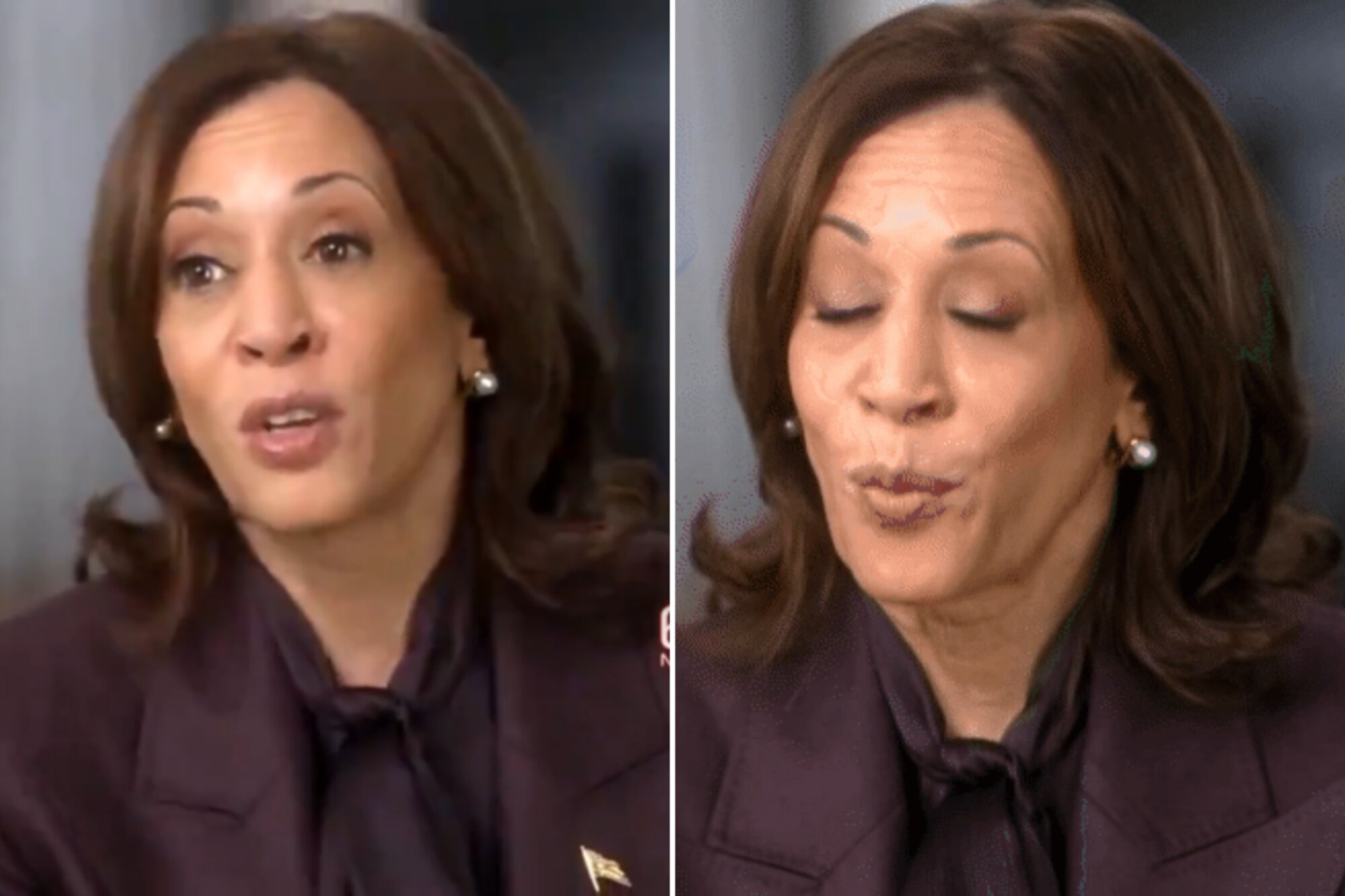
Kamala Harris struggled to explain how she would help boost small businesses and dodged repeatedly when asked about the “historic flood” of immigrants crossing into the U.S. illegally since she was vice president in an interview 60 Minutes” that aired on Monday.
Harris, 59, was unable to describe how her fiscal policies would work in the “real world,” including passing both chambers of what is likely to be a divided Congress, as CBS News correspondent Bill Whitaker accused him of being unrealistic.
“My plan is about saying that when you invest in small businesses, you invest in the middle class and you strengthen America’s economy,” Harris told Whitaker during the meeting.
“Small businesses are part of the backbone of America’s economy,” she reiterated.
“Excuse me, Madam Vice President, the question was, ‘How are you going to pay for it?'” Whitaker interrupted.
“Well, one of the things I’ll make sure,” Harris began, blinking repeatedly in surprise at the questioner’s reaction, “is that the wealthiest among us—who can afford it—pay their fair share in taxes.”
“It’s not fair that teachers, nurses and firefighters pay a higher tax rate than billionaires and the biggest corporations. And I plan to make that fair,” she continued.
“But we’re dealing with the real world here,” Whitaker interjected. “How are you going to get this through Congress?”
“You know, when you talk quietly to a lot of people in Congress, they know exactly what I’m talking about because their constituents know exactly what I’m talking about,” the vice president said before repeating herself again. “Their constituents are those firefighters, teachers and nurses.”
Harris’ economic agenda — which includes raising the amount of tax credits offered to startups to $50,000 — is estimated to add $3.5 trillion to the national debt, according to a nonpartisan analysis by the Committee for a Responsible Federal Budget released Monday. even when taxes go up. on corporations, the ultra-rich and others to the tune of $4.25 trillion.
Billionaires and other high earners also pay no lower taxes than teachers, nurses or firefighters, according to analyzes by the US Treasury Department and the Congressional Budget Office.
The top 1% income bracket bears 46% of the country’s tax burden with a current tax rate of 37%, according to economists.
The average tax rate for teachers, nurses and firefighters based on the average earnings of these occupations is 22% – but can be as high as 12% for married couples and heads of households.
Critics have seized on Harris’ word salads during her time in office, which has led her to be compared to Julia Louis-Dreyfus’ sullen character Selina Meyer on HBO’s Veep.
Often, the vice president resorts to repetition when asked to clarify her positions — most recently in an interview last week with MSNBC’s Stephanie Ruhle, when Harris used the word “holistic” three times in 23 seconds.
Harris, who has embraced President Biden’s latest “crackdown” on illegal immigration, was sidetracked when asked by Whitaker why the administration didn’t aim to stop illegal border crossings years ago.
The vice president blamed Congress for not passing legislation to “actually fix” the border crisis.
“There was a historic flood of undocumented immigrants coming across the border in the three years of your administration,” Whitaker noted in a follow-up.
“Arrivals quadrupled since President Trump’s last year — was it a mistake to loosen immigration policy as much as you did?”
Harris called illegal immigration a “longstanding problem” and argued that “the solutions are ready and from day one, literally, we’ve been providing solutions.”
“Was it wrong to allow that flood to happen in the first place?” Whitaker pressed.
“The policies we’ve proposed are about fixing a problem, not promoting a problem,” Harris argued.
“But the numbers quadrupled under your watch,” the 60 Minutes correspondent replied.
To which Harris replied: “The numbers today, because of what we’ve done, we’ve cut the flow of illegal immigration in half.”
Harris returned to her criticism of Congress when Whitaker tried to ask a third time whether the administration should have pursued those policies sooner.
Harris was also asked by Whitaker to respond to criticism that she is it flips on so many issues — fracking, immigration and Medicare for all — that voters “don’t really know what you believe or what you stand for.”
The vice president argued that her policy changes are part of an effort to build “consensus.”
“I’ve been traveling our country and listening to people and looking for what’s possible in terms of common ground,” Harris said. “I believe in building consensus.”
“We are a diverse people — geographically, regionally, in terms of our backgrounds — and what the American people want is for us to have leaders who can build a consensus,” she added, serving up some of her word salad. . .
“It’s not a bad thing,” Harris said of compromising on policy, “as long as you don’t compromise your values.”
Meanwhile, Democratic vice presidential candidate Tim Walz acknowledged that Harris “probably doesn’t agree” with how he has embellished stories from his past.
“She said, ‘Tim, you know, you have to be a little more careful how you say things,’ whatever that is,” Walz said of what the vice president has told him since the lies he was told on the record his military. and being in China during the Tiananmen Square massacre have surfaced.
“I think people know who I am, and I think they know the difference between someone who expresses emotion, tells a story, gets an appointment wrong, versus a pathological liar like Donald Trump,” the Minnesota governor said.
“I think I can,” Walz said when asked if he could be trusted to tell the truth. “I’ll admit to being stubborn at times, but those closest to me know I keep my word.”
#Kamala #Harris #turns #questions #historic #flood #immigrants #times #answers #economic #policy #tense #Minutes #interview
Image Source : nypost.com